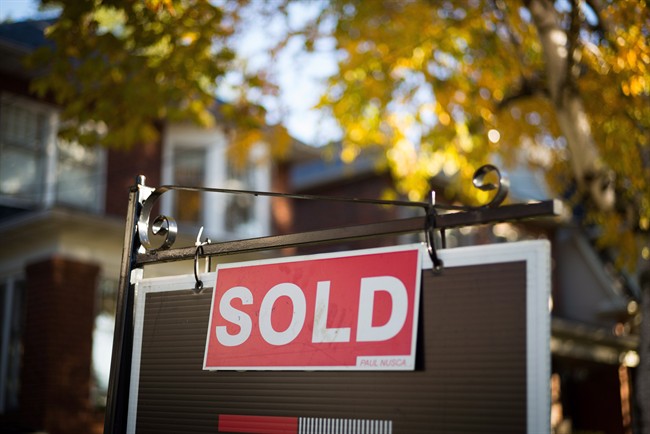Earlier this week, the Toronto Real Estate Board released data confirming what many of us had suspected: over the last year, the average house price in the Greater Toronto Area (GTA) increased by 33.2 per cent, up from the 20 per cent increase of the previous year.

Politicians quickly expressed their concern. The federal Finance Minister, Bill Morneau, has called for a meeting with Ontario Finance Minister Charles Sousa and Toronto Mayor John Tory to deal with the issue.
Sousa has already stated there will be a number of measures in the spring budget to address this, while Tory reiterated the possibility of instituting a tax on vacant homes in the city, of which there are an estimated 65,000.
WATCH: Average GTA home price nears $1 million

Yet in the midst of the predictable responses from our politicians, it struck me that the way we’ve been talking about housing prices in the GTA has been missing the mark. Tory noted that rising housing prices are deeply troubling to a lot of people who are trying to buy homes in the city. Politicians at every level have long been saying the same.
READ MORE: More government intervention needed if Toronto house prices continue soaring: Scotiabank
This entire conversation around housing prices has been focused on people who are aiming to get into the market but for one reason or another — low supply, alleged foreign buyers, baby boomers refusing to downsize — are priced out of affording a home. And while I can certainly appreciate the concern as someone who has herself been outbid on several modest, starter homes, the discourse surrounding the increasingly unsustainable housing prices has left out a very important and sizable demographic: those who have over-leveraged themselves to get into the market.
- Trudeau says ‘good luck’ to Saskatchewan premier in carbon price spat
- Canadians more likely to eat food past best-before date. What are the risks?
- Hundreds mourn 16-year-old Halifax homicide victim: ‘The youth are feeling it’
- On the ‘frontline’: Toronto-area residents hiring security firms to fight auto theft
Longtime owners will be fine, of course. Indeed, assuming they haven’t drawn out too much equity through a line of credit, and they’ve done well in recent years, they don’t have much to fear from even a substantial correction or the inevitable eventual rise in interest rates. But let’s put those people aside for a minute and focus solely on those who have bought into the market in the last few years.
READ MORE: Toronto, Vancouver add nearly $150,000 to average Canadian house price
New mortgage rules mean houses with a purchase price above one million require a minimum 20 per cent down payment. Doing some simple arithmetic on a starter house that has been sold for $1.3 million, which of course went $500,000 over asking as seems to be the norm these days, means a down payment of at least $260,000.
WATCH: Average GTA home price jumped 20 per cent in 2016

This also means land transfer taxes and legal fees of approximately $40,000 if the house is in Toronto proper (assuming you’re a first-time home buyer, taking advantage of available tax credits). And for our purposes, let’s also assume our buyer here isn’t a wealthy foreign buyer snapping up real estate to park some wealth in a safe country — just an average Canadian looking for a place to live.
That’s $300,000, upfront before you’ve packed a single box or picked a single new paint colour for your new living room. Given that the median household income in Toronto is $75,270 unless this person already has considerable family wealth, they are, to put it mildly, somewhat screwed. There’s a good chance they’ve had to do what we’re hearing more and more of — borrowing money just to come up with the down payment needed to borrow even more money.
READ MORE: Impact of Toronto-area home prices being felt in wider circle of Ontario cities: CMHC
Even a modest cooling of the market could potentially still be catastrophic for someone who, at the urging of irresponsible real estate agents and with the encouragement of banks that are more than willing to dole out mortgages and lines of credit to people, has indebted themselves beyond what has been normally considered reasonable.
Such a modest cooling isn’t a guarantee that those like me will get their chance at home ownership. A slump will make people even more likely to hold onto their properties as long as they can, lest they be forced to sell while underwater. I’ll only be able to buy a home that someone is willing to sell, and if there’s a significant shock to the financial system resulting from loan defaults and widespread fear, getting a mortgage in the first place could, for non-owners like me, become even harder.
But there is something to be said about a population that will see their mortgage rates go up while the value of their house goes down, all the while people who have stayed out of the market and have continued to save for a down payment, still have their savings. Additionally, by not defaulting on mortgage or home equity loan payments, people in my situation also have their credit rating intact.
Home ownership has long been part of the Canadian dream. For many, it’s likely to remain a dream, while for others, it could become a nightmare. We need to have a discussion about this that includes more than just a focus on would-be first-time buyers and includes those vulnerable owners already in the market. We may not all own homes, but like it or not, we’re in this together.
Supriya Dwivedi is host of The Morning Show on Toronto’s Talk Radio AM640 and a columnist for Global News.




Comments